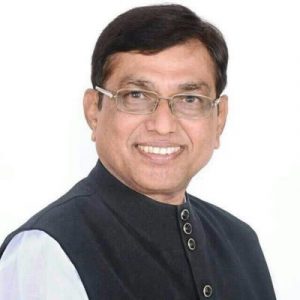Dr Kirit P Solanki is with the Bharatiya Janata Party (BJP) and has been a member of Parliament since 2009. He represented the Ahmedabad West Constituency in the 16th Lok Sabha and is known for introducing several private member’s bills during his tenure.
In the 2014 Lok Sabha elections, Dr Solanki defeated Vaghela Ka (of INC party) by a margin of 49264 votes. The constituency with 1534400 voters saw a turnout of 62.87% and he received 63.97% of the polled votes. The MP will be contesting for a third time from the same seat when Ahmedabad goes to polls on April 23rd.
Personal Information
- Age– 68
- Party – Bharatiya Janata Party (BJP)
- Term– 2009-2014; 2014- present
- Profession– Medical Practitioner; Social Worker; Professor; Consultant Surgeon; Advanced Laparoscopic Surgeon.
- Educational Qualification– M.B.B.S, M.S , F.I.C.S
- Email– sansadkiritsolanki@gmail.com
- Contact No– +91 99250 04644, +91 90131 80144
- Address– Chirag Bungalow, 11, Kirtan Society, Near 132 Feet Ring Road, Ranip Cross Road, Ahmedabad- 382480, Gujarat
- Twitter– @drkiritpsolanki
Source: Lok Sabha/myneta.info
Assets and Liabilities (2014)
| 2014 | 2019 | |
| Movable assets | 80,85,266 | 43, 66,777 |
| Immovable assets | 2,60,00,000 | 8,51.07,262 |
| Total | 3,40,85,266 | 8,94,74,039 |
| Liabilities | 2,08,007 | NIL |
All figures in INR. Source: myneta.info
Criminal cases
None
Positions Held (2014 onwards)
- (14 Aug 2014- 19 July 2016)- Member, Committee on Welfare of Scheduled Castes and Scheduled Tribes.
- (1 Sep 2014 onwards)- Member, Standing Committee on Finance; Member , Consultative Committee, Ministry of Petroleum.
- (19 July 2016 onwards)- Chairperson, Committee on Welfare of Scheduled Castes and Scheduled Tribes.
Source: Lok Sabha
MP in Parliament
Dr Solanki has done very well in terms of attendance and participation in debates, He has 100 percent attendance in the first consecutive nine parliamentary sessions, and an average attendance of 97 percent.
| MP | Attendance | No of Debates | No of questions asked | Private Member’s Bill |
| Dr Kirit Solanki | 97% | 333 | 416 | 37 |
| National average | 80% | 67.1 | 293 | 2.3 |
| State (Gujarat) average | 84% | 41.1 | 285 | 2.6 |
Source: PRS Legislative Research
Some of the debates in which Dr Solanki participated relate to:
- Welfare of Scheduled Caste and Scheduled Tribes
- Illegal immigration of Bangladeshis
- Need for research on thalassemia gene therapy
- Health care issues of tribals
- Rising mob lynching incidents
- Ill behaviour meted to people from the north-eastern states
The MP introduced 37 private bills, which is the second most by any Parliamentarian during the 16th Lok Sabha. All of them are pending in Parliament except one which has been withdrawn. Some of these are:
- The Real Estate (Regulation and Development) Amendment Bill 2018
- The Right to Play Sports Bill 2018
- The Compulsory Mental Healthcare Counselling Facilities in Government Schools Bill, 2016
- The Tuberculosis (Prevention and Control) Bill 2017
- The National Witness Protection Bill 2016
- Rainwater (Harvesting and Storage) Bill 2016
MPLAD funds
Out of the 25 crores dedicated to Ahmedabad West, Dr Solanki had utilized 3.18 crores.
| Recommended Amount | Rs 3,18,84,050 |
| Sanctioned Amount | Rs 3,17,84,101 |
| Utilized Amount | Rs 3,18,84,050 |
Dr Solanki’s recommendations have all been for the improvement of Anganwadis services in his constituency. He has made recommendations for 319 such projects, out of which all of them have been sanctioned and closed.
Source: Ministry of Statistics and Programme Implementation, GoI
MP in the news
Dr Solanki has been in the news for several of the private member bills that he has introduced including – The Compulsory Mental Health Care in Government Schools Bill, which aims at providing mental health support to children especially in village areas; The Acid (Control) Bill 2014, which aims to curb the sale of acid; and The Domestic Workers(Decent Working Conditions) Bill 2015, which aims to put just processes in place for the sector.
During a visit to Himachal Pradesh as the Chairman of the Parliamentary committee on SC and ST, he called for the setting up of SC/ST commission in the state on the model present in other states. During the interaction with the state’s Chief Secretary and senior officials, he asserted that strict action should be initiated in cases of atrocities against SC/ST.
On the 127th birth anniversary of B.R.Ambedkar, Dalit activists who were supporters of MLA Jignesh Mevani (representing Vadgam constituency in Gujarat Assembly) protested against and tried to prevent the garlanding of Ambedkar’s statue by Dr Solanki and BJP workers. Jignesh Mevani had earlier stated that he would not allow BJP to pay homage to Ambedkar.
